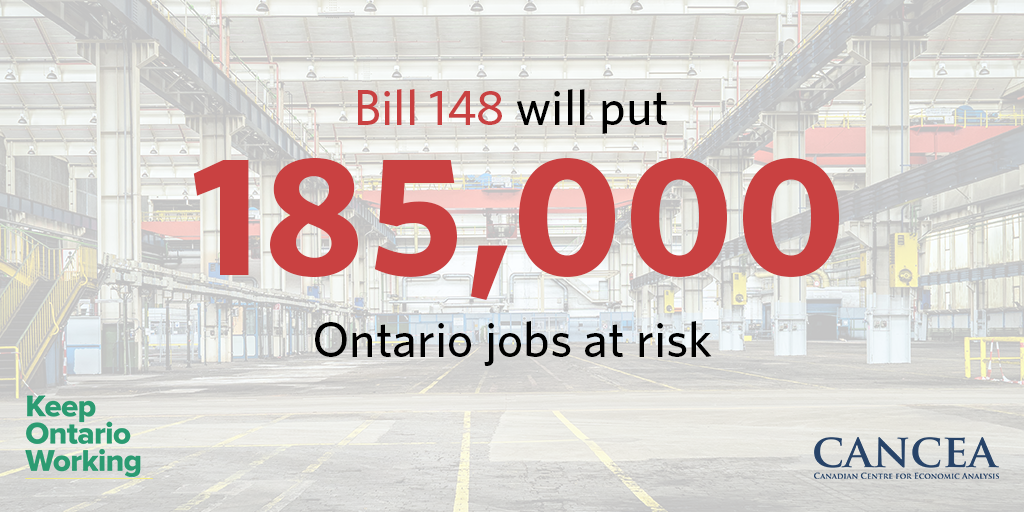
Bill 148 will increase the cost of consumer goods and services by $1,300 per household starting in 2018, according to new analysis by leading economic's firm, CANCEA.
Yesterday the Keep Ontario Working Coalition (KOW), in partnership with the Ontario Chamber of Commerce and Oakville Chamber of Commerce, released the first and only independent economic impact analysis of Bill 148, the Fair Workplaces Better Jobs Act. Conducted by the Canadian Centre for Economic Analysis (CANCEA), the study revealed that if the legislation is implemented as currently drafted, there will be significant, sudden and sizeable uncertainty for Ontario jobs, economy and communities.
The Oakville Chamber of Commerce's initial reaction to Bill 148 was first outlined in: Oakville Chamber objects to potential labour & employment standards reforms by Faye Lyons.
CE study concludes that these vast, unprecedented reforms will put about 185,000 jobs at risk in the first two years, greatly impacting Ontario’s most vulnerable workers.
“The changes presented in Bill 148 will have dramatic unintended consequences that include putting close to two hundred thousand jobs at risk and seeing everyday consumer goods and services increase by thousands of dollars for each and every family in Ontario,” said Karl Baldauf, Vice President of Policy and Government Relations at the Ontario Chamber of Commerce and spokesperson for the Keep Ontario Working Coalition. “We’ve run the numbers and it’s clear that this is too much, too soon. If the Ontario government chooses to proceed with these sweeping reforms too quickly, all of us will be affected, and the most vulnerable in our society chief among them.”
“Since the announcement of Bill 148, we have heard an overwhelming number of concerns raised by Oakville Chamber members over the size, and in particular, the timing of these proposed changes. They expressed their concerns over the unintended consequences of job losses due to rising costs, the inability to remain competitive, increased costs to consumers and the unfortunate reality of shutting down their business,” stated John Sawyer, President of the Oakville Chamber of Commerce. “
"Working with the Keep Ontario Working Coalition, our goal is to address elements of the legislation where we think there is still room for negotiation, while bringing forth the evidence from this economic analysis to show the impact this will have on business and consumers,” continued Mr. Sawyer.
CANCEA was commissioned by the KOW coalition to measure the potential impacts of six key areas of change in Bill 148, including changes to minimum wages, “equal pay” provisions, vacation, scheduling, personal emergency leave (PEL) and unionization.
Data from the economic impact analysis shows:
- $23 billion hit to business over the next two years alone
- 185,000 Ontario jobs will be at immediate risk over the next two years
- 30,000 of the jobs at risk are for youth under 25 96,000 employees at risk are expected to be women
- 50 per cent increase to inflation for this year and the foreseeable future. The cost of everyday consumer goods and services will go up by $1,300 per household on average each and every year
- The Ontario government would need to borrow $440 million more to cover the increases in new costs from this legislation. If the government were to provide offsets to businesses, as they have indicated, the province’s treasury will take a bigger hit
- Municipalities will be forced to increase employee wages by $500 million without additional offsetting revenues
“Simple accounting reveals that the Act creates a $23 billion challenge for Ontario businesses over two years. Annualized, this is 21 per cent of what Ontario businesses invest in capital,” Paul Smetanin, President, CANCEA. “Given the significant, sudden and sizable changes it would be remiss to expect that unintended consequences would not follow.”
In the coming weeks and months, the KOW coalition will release additional components to the economic impact analysis.
“Given the scale of impact and pace of change, it will be impossible for the provincial government to make businesses, even small businesses, whole through offsets,” added Baldauf. “With amendments to the first reading of Bill 148 due this Wednesday, the legislation will need to see serious change including an adjusted timeline for implementation.”
Since Bill 149 was introduced in June, the KOW coalition has called on the government to conduct an economic impact analysis to fully understand how the legislation will change Ontario’s economy. With the government unwilling to do so, the report released today represents the first and only independent economic analysis of this legislation.
For more details on the economic analysis, visit keepontarioworking.ca